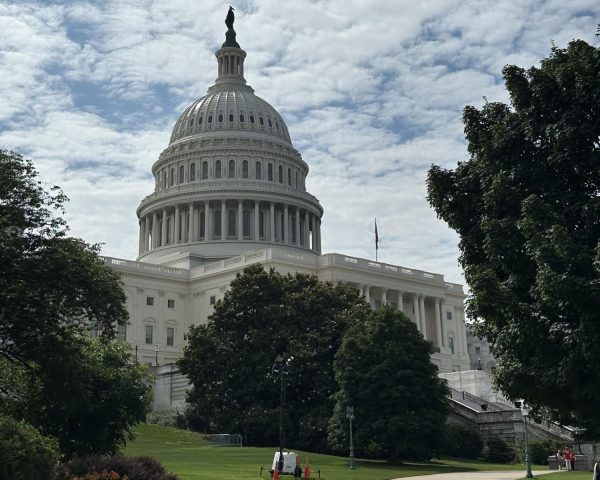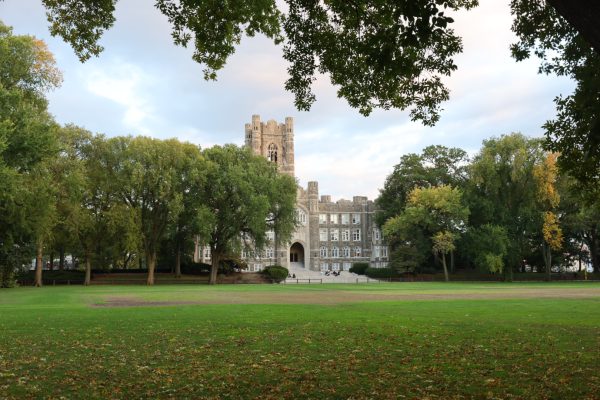Fordham Introduces a Chinese Studies Major
Beijing, the capital of China, also acts as the capital of the Eastern economy. Largely considered to be the lingua franca of business, Mandarin is a very important language globally.
Fordham University has recently introduced a new major in the Modern Languages department: Chinese studies. The Chinese studies major is a passion project spearheaded by department chair Andrew Clark, Ph.D. and his colleagues Yiju Huang, Ph.D. and Britta Ingebretson, Ph.D. Acknowledging a severe void in representation of Asian studies at the university, these three sought to establish a Chinese studies major with the goal of “[enabling] Fordham students truly to be exposed to different ways of thinking and viewing the world,” brought on by the tremendous popularity of the Mandarin minor and “Dr. Huang’s upper-level classes continuing to grow,” said Clark.
In the past, Fordham has been criticized for the Eurocentricity of its curriculum; professor James Kim launched a petition in 2021 calling for the establishment of an Asian American studies department. Given that the university prides itself on its global and well-rounded liberal arts education, many faculty members and students have been disappointed by the lack of opportunities afforded to those looking to study Asian cultures and languages. In the face of a rise in anti-Asian rhetoric and a particularly small Asian student population, this complacency has been viewed as ignorance.
According to Clark, a Chinese studies major has been in the works since fall 2019 and special care has been taken to acknowledge the “multidisciplinary and interdisciplinary” nature of China, as well as its relationship to other countries. In the proposal to the university, Clark, Huang and Ingebretson state that there is an “unmet demand for the Chinese studies major” and that the program would “encourage productive conversations and collaborations among the faculty.” Huang, a specialist in Chinese culture, said that the major will help students “develop a complex understanding of China” and its “diachronic and synchronic dimensions,” something that has become essential in the growth of our international order.
Upon learning about the new release of this major, Fordham’s Asian Cultural Exchange felt it was a “welcomed step in the right direction,” knowing that “many students will be interested in taking at least a few courses offered by the Chinese studies major.” The club celebrated the fact that “as the world becomes increasingly globalized,” the university has enacted real change in its curriculum to reflect our diversified nation and world.
Courses will be offered in both Mandarin and English, giving non-native students the opportunity to learn about the country and apply it to their own majors, such as international studies, history or political science. In the proposal submitted by the Modern Languages department, the major has a diverse and impressive course catalog, including: MAND3055, China and Globalization, and POSC3631, China and Russia in Comparative Perspectives. The major itself will consist of ten courses — four required, six elective — and will hopefully represent an important beginning in Fordham’s attention to Asian studies.
Currently, the major has five students across Rose Hill and Lincoln Center, but the department anticipates “20-25 students” becoming Chinese studies majors by the end of the academic year, as per its proposal. Clark and Huang have stated their intention to recruit a “new tenure-track assistant professor with an ideal specialization of political science (or history)” to begin teaching next semester. This professor would join the department and teach a number of these new courses within the breadth of the Chinese studies major. The university has “77 amazing candidates” from all over the world, “the vast majority native speakers of Mandarin,” said Clark, and all eager at the prospect of this new program.
This major will mark the start of an important turning point in Fordham’s history: an acknowledgment of Asian cultural diversity is paramount in order to provide a global curriculum. According to Clark, one of his personal goals since becoming department chair seven years ago has been to “make Fordham more multilingual,” in which he feels this is the first step.
“We often speak of Fordham as global but we often forget the linguistic and cultural components of what being global requires,” said Clark.
This program represents the beginning of something greater for the university and will act as motivation for a more diverse course and major offerings in the future.

Samantha “Sam” Minear is a senior from Long Branch, N. J., majoring in international studies and communications. She started as a contributing writer...











































































































































































































